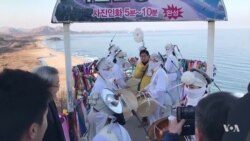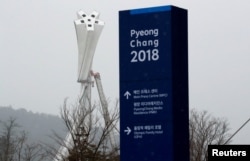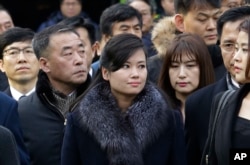Olympic hosts in South Korea are working to transform the heavily militarized border area, just north of Pyeongchang, into a tourist attraction emphasizing the theme of inter-Korean peace.
North Korea’s participation in the upcoming PyeongChang winter Olympics to be held in South Korea has defused regional tensions for now over Pyongyang’s continued development of nuclear weapons and long-range ballistic missiles.
DMZ
Inside the demilitarized zone (DMZ) checkpoint on the east coast of South Korea, is the Goseong Unification Observatory, where visitors can look across to the mountains of North Korea. It is here where the Gangwon Province Olympic hosts this weekend launched an arts festival focusing on the tragic division of this land and hopes for its eventual unification.
In addition to musical and artistic performances emphasizing the shared culture of the two Koreans, famed Korean novelist Lee Oisoo read a poetic prayer for peace.
“The 2018 PyeongChang Olympics may give us a brief moment of unification as people of the South and North gather together and share their brotherly love,” he said.
The DMZ art festival event kicked off a series more than 40 South Korean cultural of cultural performances to be staged during the Olympics, many of which will focus on the theme of Korean reconciliation. Korean symphony orchestras, ballet troupes, traditional folk music and K-Pop stars are scheduled to perform both in Pyeongchang where the outdoor skiing events will be held and in the coastal city of Gangneung where the ice skating rinks are located.
North Koreans coming
South Korean officials hope North Korea’s decision to send an Olympic delegation to Pyeongchang, including 140 artists and musicians to perform, will ease international concerns that a military conflict might erupt during the games.
“People who are coming from abroad worry that this region may be very dangerous, but it will be our pleasure to work with them to ease their concerns,” said Gangwon Province Governor Choi Moon-Soon.
Governor Choi also said the North Korean artists will not be paid for their performances and that the South Korean government will assume the cost of providing food, lodging, transportation and security for the North Korean visitors. Security forces with the North Korean delegation are expected to prevent anyone from the North from attempting to defect to the South during the games.
On Monday a North Korean delegation inspected venues in Seoul to prepare for their upcoming performances. The delegation is being led by Hyon Song Wol, head of North Korea's Samjiyon Orchestra.
About 50 protesters rallied against the visit in front of the Seoul train station and burned a banner bearing photographs of North Korean leader Kim Jong Un.
The North Korean visit was originally scheduled for Saturday, but was suddenly canceled, and then rescheduled for Monday. No explanation has been given for the delay.
The North will also send 22 athletes to the Winter Games and compete in three sports and five disciplines, according to the International Olympic Committee (IOC.)
North Korea's state-run KCNA news agency on Sunday criticized South Korean politicians and media who have questioned Pyongyang's motives in participating in the winter games, saying it is not about seeking relief from international sanctions but “to improve the North-South relations and to ensure successful Olympics.”
DMZ destination
The DMZ itself, officials hope, will also become an Olympic destination where visitors can see historical sites like the summer home of North Korean founding leader Kim Il Sung that became part of the south at the end of the Korean War in 1953.
There is also a DMZ museum recounting decades of the tense military standoff between North and South, along with competing propaganda efforts that often used beauty and sex appeal to capture hearts and minds.
Museum curator Noh Yeon-soo, says he hopes that Korea’s Olympic peace offensive will increase visitor interest in the divided history of the country.
“”It has just been announced and is under progress, so I cannot quite feel it here yet, but I can suspect that it will influence South Koreans to pay attention to it,” said Noh.
Hyung Jin Kim and Youmi Kim in Seoul contributed to this report.









